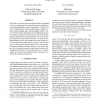Free Online Productivity Tools
i2Speak
i2Symbol
i2OCR
iTex2Img
iWeb2Print
iWeb2Shot
i2Type
iPdf2Split
iPdf2Merge
i2Bopomofo
i2Arabic
i2Style
i2Image
i2PDF
iLatex2Rtf
Sci2ools
CISS
2008
IEEE
2008
IEEE
On flat-rate and usage-based pricing for tiered commodity internet services
In this note, we discuss issues pertaining to end-to-end qualityof-service management of commodity Internet applications and associated pricing incentive mechanisms. The issue of service differentiation is first studied using a simple twoclass model including delay and throughput sensitive traffic. We show that by introducing service differentiation one can make more efficient use of resources, however this depends on the differences in required QoS as well as the typical capacities of the systems involved. As such, service differentiation may be more beneficial in lower capacity access networks than in high capacity core networks. We then focus on delay-sensitive and study flat-rate versus usagebased pricing under overload conditions. Our results suggest that in overload scenarios usage-based pricing is advantageous both from the system perspective, i.e., reduces degree of overload, and individual users’ perspective, increases their perceived utilization.
Capacity Access Networks | Capacity Core Networks | CISS 2008 | Information Management | Pricing Incentive Mechanisms |
| Added | 29 May 2010 |
| Updated | 29 May 2010 |
| Type | Conference |
| Year | 2008 |
| Where | CISS |
| Authors | George Kesidis, A. Das, Gustavo de Veciana |
Comments (0)

